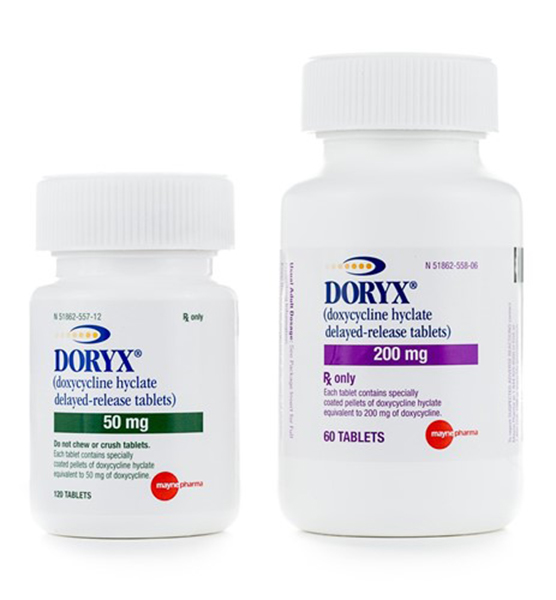DORYX® Delayed-Release Tablets

DORYX® Delayed-Release Tablets
Doryx® (doxycycline hyclate delayed-release tablets) for the Adjunctive Treatment of Severe Acne*
- A tetracycline-class antimicrobial indicated as adjunctive therapy for severe acne available in 50 mg and 200 mg dosage strengths for a range of dosing options1
- The only branded doxycycline option with enteric coating designed to minimize GI tract exposure to doxycycline1-3
- Contains pH sensitive enteric-coated pellets of doxycycline hyclate1
May Be Taken With Food Or Milk Or On An Empty Stomach1
- Tablet contents (enteric-coated pellets) may also be sprinkled on applesauce1
*The usual dose of oral doxycycline is 200 mg on the first day of treatment (administered 100 mg every 12 hours), followed by a maintenance dose of 100 mg daily. In the management of more severe infections (particularly chronic infections of the urinary tract), 100 mg every 12 hours is recommended.
Indication and Usage
Doryx® (doxycycline hyclate delayed-release tablets) is a tetracycline-class antimicrobial indicated as adjunctive therapy for severe acne. To reduce the development of drug-resistant bacteria as well as to maintain the effectiveness of Doryx® and other antibacterial drugs, Doryx® should be used only as indicated.
Selected Safety Information about Doryx® (doxycycline hyclate delayed-release tablets)
Doxycycline is contraindicated in patients who have shown hypersensitivity to any of the tetracyclines. Tetracycline-class drugs, like Doryx® (doxycycline hyclate delayed-release tablets), can cause fetal harm when administered to a pregnant woman. Doryx® should be avoided if possible by nursing mothers, taking into account the importance of the drug to the mother. Doryx® should not be used in children during tooth development (up to the age of 8 years). Concurrent use of tetracycline-class antibiotics with oral contraceptives may reduce their effectiveness.
Clostridium difficile associated diarrhea (CDAD) has been reported with nearly all antibacterial agents including doxycycline, and may range from mild diarrhea to fatal erythema.
Photosensitivity can occur with tetracycline-class drugs. Doryx® patients should minimize or avoid excessive exposure to natural or artificial sunlight, and consider using sunscreen or sunblock. Advise patients to discontinue therapy at the first evidence of skin erythema.
Overgrowth of non-susceptible organisms, including fungi, may occur. Doryx® should be discontinued if superinfection occurs and appropriate therapy instituted. Adverse reactions observed in patients receiving tetracyclines include anorexia, nausea, vomiting, diarrhea, rash, photosensitivity, urticaria and hemolytic anemia.
Intracranial Hypertension (IH) has been associated with the use of tetracyclines. Women of childbearing age who are overweight or have a history of IH are at greater risk for developing tetracycline-associated IH.
Adverse reactions observed in patients receiving tetracyclines include anorexia, nausea, vomiting, diarrhea, rash, photosensitivity, urticaria, and hemolytic anemia.